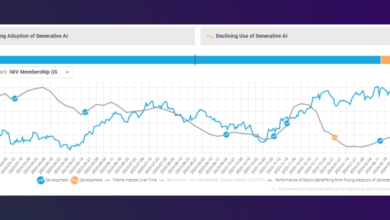Half of UK businesses claim to be piloting Generative AI use cases

Business leaders becoming increasingly optimistic about use of Generative AI. Over half are introducing it to their firms to some extent, according to research from Eden McCallum among 200 business leaders.
Corporate leaders in the UK remain wary of the country’s future, with a recent poll from Eden McCallum suggesting that 58% of businesses are to some degree pessimistic about the domestic economic outlook. However, in line with previous polls from the researchers, bosses were much more bullish when it came to the prospects of their individual firm – with 72% saying they were optimistic on the outlook for the coming year.
Source: Eden McCallum Business Outlook
In spite of the uncertainty they face in an election year, and with various headwinds including inflation and geo-political crises still lingering into 2024, the respondents said that a host of new opportunities meant they still had high hopes looking ahead. Most prevalent was an optimism that artificial intelligence – and particularly Generative AI – would buoy productivity and help find efficiency savings even amid tough times on a national or international level.
Speaking to more than 200 business leaders across Britain, Eden McCallum found that the importance of GenAI on their agendas has risen steadily over the last 12 months. When asked how important they felt the technology was in the present, not much seems to have changed – with just under 40% saying they felt it was important when polled in mid-2023, and mid-2024. But amid the sustained hype of what the technology could do in the future, its prevalence has become more evident looking ahead. While 55% said it would be important over the coming three years in 2023, that figure has risen to 62% now.
Half of UK businesses claim to be piloting Generative AI use cases
That is translating to rapid adoption of the GenAI, according to the respondents. When asked about their current actions in mid-2024, a majority of 57% said they were at least exploring use cases, while 58% said they were already piloting use cases for the technology. In particular, bosses are drawn to GenAI by its ability to reduce costs, with 75% saying they expect it to help reduce costs and boost efficiency.
While this prospect excites employers, the news might be a cause for alarm for workers. Despite champions of the technology long insisting that it will create roles, rather than simply seeing firms shed headcount to save money, few firms seem to be investing in creating an in-house workforce which can make the most of GenAI. Even as staff turn to the internet in desperation for training, just 30% of respondents told Eden McCallum that they were spending on training existing staff to use AI. Meanwhile only 22% are recruiting new staff with relevant skills.
Half of UK businesses claim to be piloting Generative AI use cases
This might suggest the wider expansion of a nascent trend across multiple sectors. Amid the so-called AI revolution, some firms have laid off large numbers of staff whose services are supposedly no-longer required for tasks the technology can handle. Then the companies announce new outsourcing agreements with IT services companies in low-wage economies, who just so happen to have expertise in operating GenAI technology. While businesses involved have claimed the two are not connected, critics allege that this is a way of downsizing labour costs under the guise of progress – and the adoption of a technology which can’t actually replace the human workforce at this moment.
Other boosts from AI bosses expect include 63% hoping it will boost customer experience by making the engagement process quicker and more personalised. But conspicuously, only 32% said they expected GenAI would boost their employee experience.



